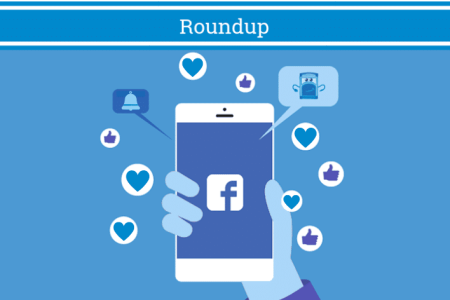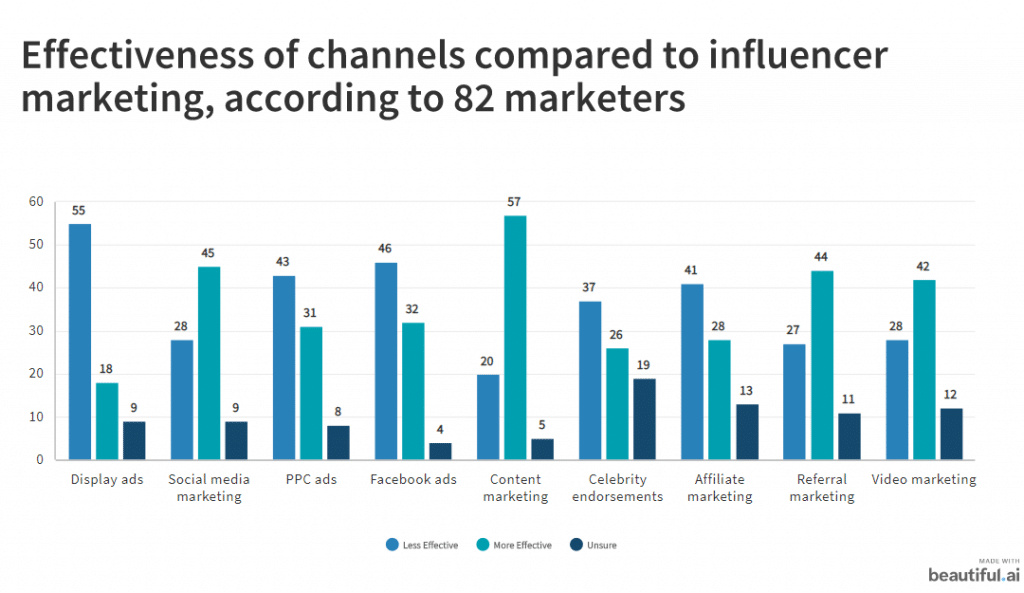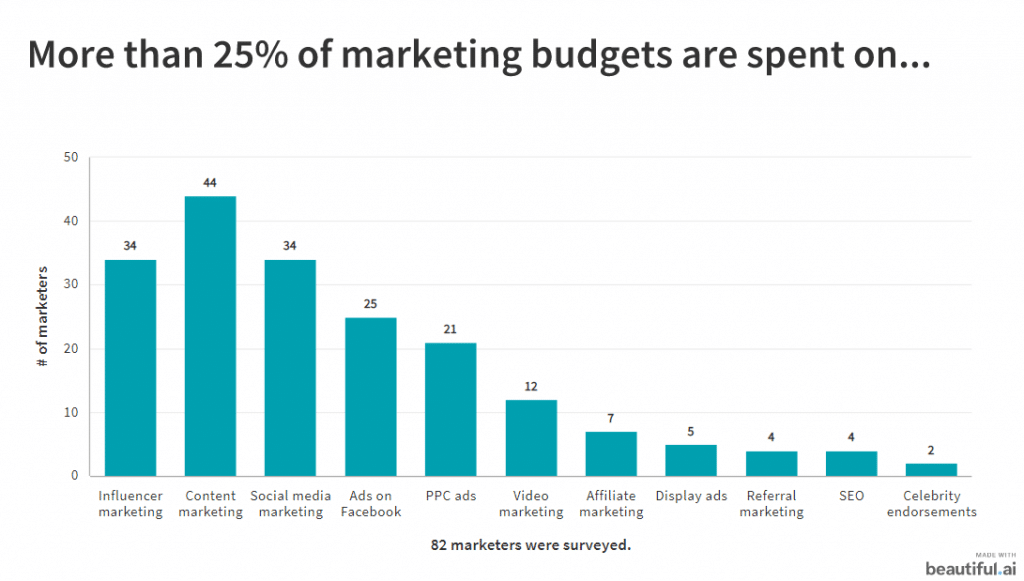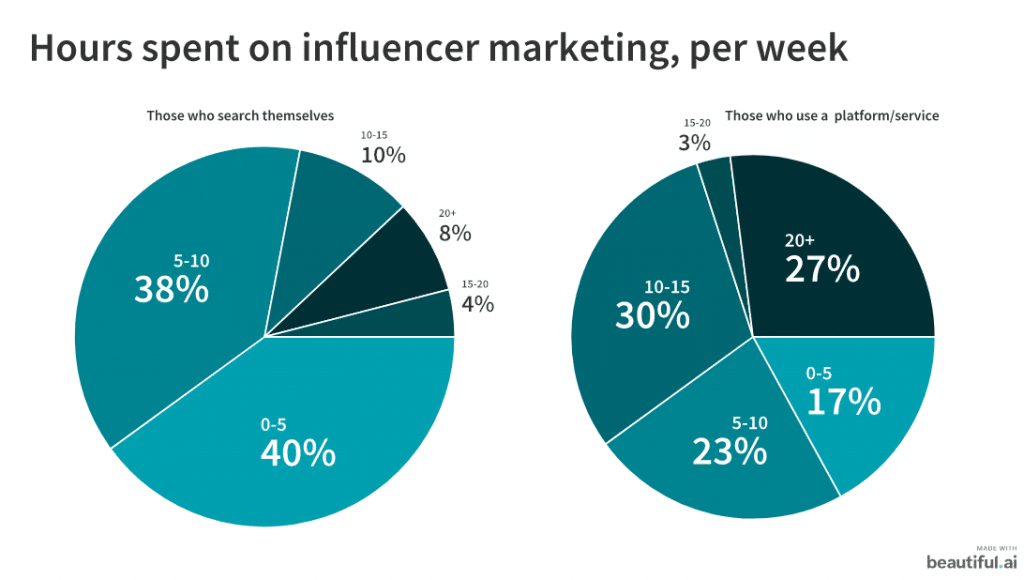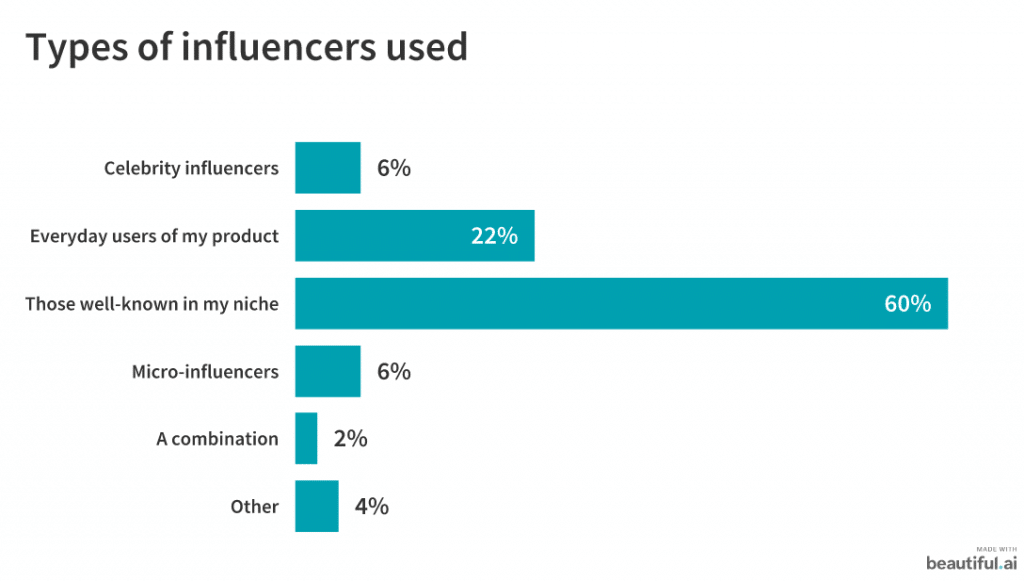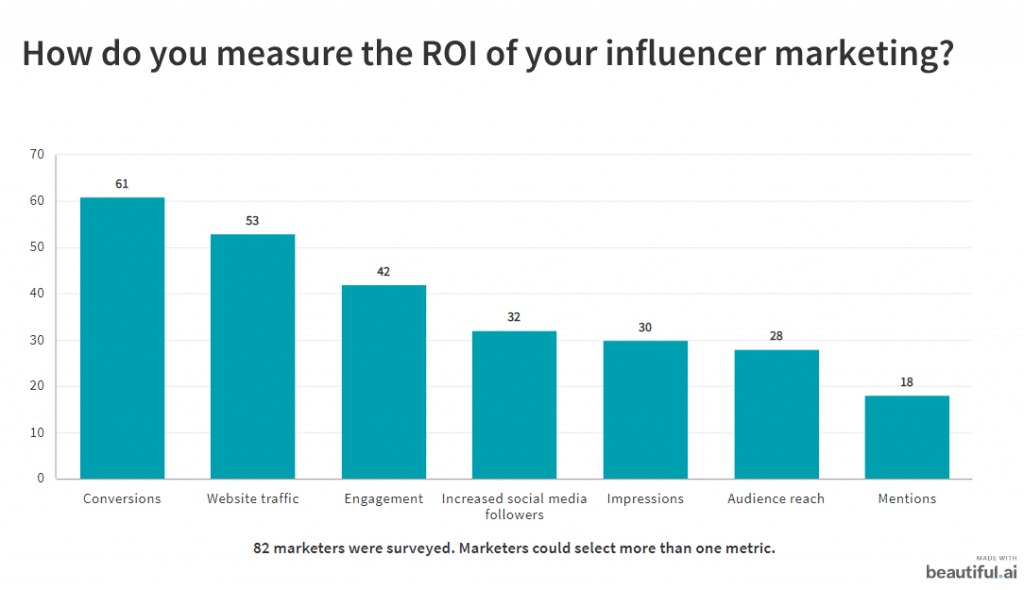Since we are a referral platform, we often get asked about influencer marketing too. Though the two are different, they both utilize word of mouth and often have the same end goal in mind (to increase leads).
We thought we’d get some expert advice on marketers who have used influencer marketing and that are familiar with the process for their advice on how to pull off successful influencer marketing campaigns.
What is influencer marketing?
Influencer marketing is when someone who is considered an ‘expert‘ or is well-known in the field, uses their reputation to help you market your product. (Unlike referral programs which focus on using your customers to spread the word).
Typically speaking, influencers have a certain ‘influence’ over their followers as they are seen as trustworthy sources within their niche. They use this influence to persuade and get others excited about your brand.
Many influencers use social media, blogs, and videos to help get out their message. Between custom content made for specific brands, to hashtags, to simple Instagram shout outs, an influencer has a variety of avenues to talk about your brand.
Here is an infographic that illustrates The Pros and Cons of Using Influencer Marketing for Your Brand.
Influencer marketing statistics
There are a ton of influencer marketing statistics already out there. But, we wanted to see if we could come up with similar findings to prove that influencer marketing is as effective as they say.
We received 82 responses to our survey! We had quite a range of business types respond: the long list includes, transportation, digital marketing, entertainment, finance, agencies, eCommerce, tech, health, travel, home, P2P, SaaS, subscription, enterprise, and public relations.
We were thrilled with the spread! Even with the wide variety of respondents, we saw a few common factors…
Influencer marketing is king compared to display advertising
Influencer statistics stand true. For one of our questions, we asked the marketers to compare influencer marketing to other forms of marketing. Here’s what stood out.
- We found that 55 out of the 82 marketers believe that display advertising is less effective than influencer marketing. This aligns with numerous other studies that mention people trust the recommendations from those they know compared to typical ads.
- However, we saw that more marketers than not felt content marketing is more effective than influencer marketing. 57 of the 82 marketers believe content marketing is more effective, while only 20 thought it was less effective.
- How does influencer marketing compare to referral marketing? 44 marketers, over half, rated referrals more effective than influencer marketing, probably because of the direct nature of referrals.
- Other marketing forms that over half of marketers rated more effective than influencer marketing were: social media marketing (45 marketers rated it more effective) and video marketing (42 marketers rated it more effective).
- Besides display ads, other marketing forms that over half of marketers rated less effective than influencer marketing were: PPC ads (43 rated them less effective) and Facebook ads (46 rated them less effective).
A full breakdown of these ratings is below.
Content marketing is more likely to take over 25% of a marketing budget
Another thing we wanted to know was where marketers planned on spending their budgets. With the increase of influencer type programs out there, we wondered if marketers accounted for spending their budgets there.
To get a good feel for where people planned on spending their budgets, we asked where marketers planned on spending at least 25% of their overall marketing budget.
The respondents were able to choose multiple options, but what we found was that a little over half of the marketers (53%) said they would be spending at least 25% of their marketing budget on content marketing. Influencer marketing (41%) and social media marketing (tied with influencer marketing at 41%) followed behind content marketing.
Only content marketing topped influencer marketing for the number of marketers who spent more than 25% of their budget.
The full breakdown of spending is below, listed by number of marketers.
Those who plan on using a service will spend more time on influencer marketing
It’s worth noting that the majority (63%) of respondents said they would be finding influencers on their own, versus using a platform or service.
However, we found that a bigger portion of those who are going to use a service to find influencers said they were more likely to spend more time on influencer marketing as a whole. 27% of those who used a service spent 20+ hours a week on influencer marketing, while only 8% of those who searched themselves spent 20+ hours on influencer marketing.
Also, when looking only at the marketers who plan on doing the work of finding influencers on their own, 78% of the respondents said they only planned to spend less than 10 hours per week on influencer campaigns. Meanwhile, only 40% of marketers who used a service spent less than 10 hours per week on influencer marketing.
The most popular influencer is someone who is well-known in that niche
If you’re browsing the web, you might often see famous influencers promoting products. What you might not realize is that a lot of other people including everyday users are also promoting products and helping brands gain exposure. 22% of marketers utilize everyday users – customers and fans – as influencers.
However, most brands want people well-known in their niche to show off their products. 60% of respondents mentioned that they want those who are “well known in my niche” to be their influencers.
So for instance, a popular beauty blogger (or someone who posts content relating to beauty who has a lot of social media followers) might be picked up by a makeup brand to promote a new product instead of someone who posts content aimed at tech and business. And that works both ways, an influencer might only want to work with brands in their niche.
Even more so, influencers and brands might hone in on a specific angle. For instance, a regular makeup brand might not be appealing to someone who prefers using organic and natural products.
Conversions are the number one way to measure influencer marketing’s ROI
How do most people determine whether their influencer marketing is working? We found that marketers don’t strictly count on one thing to see whether or not their influencer program is working. Instead, the majority of respondents mentioned using a variety of measurements.
61 marketers (74% of respondents) mentioned that conversions were what they were measuring for success.
Website traffic was the second-most-used method, with 53 marketers (65% of respondents) saying they used it to measure whether or not their influencer marketing is working.
Engagement came in third, with just over half of the marketers using it (42 marketers, or 51% of responses). However, marketers caution against using engagement metrics without paying attention to conversions. Engagement metrics include likes, comments, and shares. But sometimes, these metrics are called “vanity metrics,” as they’re considered nearly meaningless without conversions. This is why marketers believe it won’t make much difference to influencer marketing if Instagram removes its like system.
Christine Panourgias of CPSD told us, “I don’t think the removal of likes will influence good influencer marketing. Campaigns should be measured in conversions. Vanity metrics are nice, but they don’t tell the full story. If influencers can’t convert sales, all the likes and engagement in the world don’t make a difference.”
Majority rules – Most influencer programs use a mix on content
70% of marketers say that content for their influencer marketing is a mix of content. Meaning they may have specific details their influencers must mention, but the execution of the content is up to the influencer.
17% of brands said that their influencers did have complete freedom to come up with content. Meaning the brand doesn’t persuade them or give them criteria to follow. Meanwhile, 13% of brands supplied their influencers with the exact content they want to be shared.
Advantages and disadvantages of influencer marketing
We were curious to find out our marketers’ perspectives on the pros and cons of influencer marketing, so we asked them what they thought the biggest advantages and disadvantages of using influencers are.
First, we’ll look at the disadvantages. Dominic Kent of Mio says, “When you work in a niche industry, there is a danger of your influencers circulating content that you have put hard work into for the same audience that perhaps one or two would have reached. When there is a close-knit community of analysts, for example, they could end up sharing a piece they have been featured to people that have already seen the content.”
Téa Liarokapi of Moosend tells us, “The biggest disadvantage of influencer marketing is the fact that we’re dealing with a high-risk tactic that can be very costly and can produce less than ideal results. This can be due to the influencer’s own content, which may not be ideal, or even due to the followers themselves, who may ultimately not be too interested in your brand or product.”
Celeste Huffman of Rogers & Hollands attests, “The biggest challenge we have currently is finding influencers. Because we are doing it manually, it’s not the most time-efficient process. If we had a platform that wasn’t overly expensive and could help more with finding and reaching out to influencers it would be a big help.”
However, there are also plenty of advantages to using influencers. Nahamani Yisrael of Nahamani.org tells us, “The biggest advantage of using influencer marketing is that it solves the trust factor. Individuals make purchase decisions more rapidly when someone they know and trust recommends the product or service. For newly established brands, getting people to trust your business can be an expensive and challenging obstacle. Working with influencers who can share their own experiences, explain the process and educate the consumer helps make the purchasing process much less time consuming and leads to a higher conversion rate. I have had experiences where the influencer marketing was working too well so I had to increase staffing just to handle the level of demand from the exposure.”
Here’s how to pull off successful influencer marketing
Before we dig too far into tips on running a successful influencer program, we thought it would be worth noting that an influencer software can make the whole process of finding influencers, tracking their work, to issuing incentives and payments much easier than doing it on your own. (You can check out our influencer software list.)
Here are some of our experts’ suggestions on what software works for them:
Jessi Daly tells us, “If you’re interested in working with influencers on Instagram specifically, that are popular in your industry, PeopleMap is a must. It’s easy to find influencers that just have a lot of followers, but what really matters is how many of their followers are actually seeing what they post, and how much ‘control’ they have over their followers. If their followers are actively interested and engaging on their profile, we want them. But if someone has 50k followers, with a low percentage of engagement, it could mean that they bought their fake followers, or that their followers aren’t really that interested in them. PeopleMap is a great tool to use to make sure your influencers are worth it.”
Heepsy’s Patricia Garay, mentions “The possibility of finding influencers with tools like Heepsy makes it easier to track them and filter them”. She adds that “Influencer marketing has been successful because influencers are people that customers trust”.
Affan Vohra from BestVPN.co chimes in by saying that you can reach out to influencers via email, but the chances of having your email seen are slim with the amount they probably receive. “I suggest using Boomerang for Gmail”. He also goes on to say, “Moreover, Twitter is another way you can engage with your targeted influencers”. But if you are wanting an easier way to find influencers, “Followerwonk is a great tool to find an influencer, search Twitter bios, categorize influencer with engagement and active followers, this will help you to cater and engage with the most fruitful Influencer”.
Kelsey Formost of Tagger Media says, “I was first a user (and fan!) of Tagger – an incredibly easy to use, end-to-end influencer marketing platform – and I found it so helpful in my own business that now I work for them. There is so much to love about Tagger, but one feature that particularly stands out is the platform’s ability to separate mentions into “sponsored” vs “organic”.
Most influencer marketing software programs, if they even have the ability to track mentions, don’t take the extra step to separate the data into ‘organic’ vs ‘sponsored’ categories. This makes a HUGE difference when brands or agencies are analyzing influencer marketing campaign success. You get a much more accurate picture of what generates genuine interest.”
Jeff Moriarty of Moriarty’s Gem Art shares, “We currently use a program called Carro. It’s free with Shopify right now. It’s nice to use because it lists all of our fans, followers, email subscribers and customers that meet certain criteria we set. The only problem is that it is still up to us to reach out to these influencers, which can take time.”
Now, let’s dive in to cover the tips we’ve learned for running a successful influencer marketing program.
Set specific goals beforehand
You need to have a set goal in mind before you even start your influencer program. You understand the benefits of using influencers, but if you don’t define what you’re wanting to accomplish with your program before starting, your program can fizzle and you might not reach the potential you could have.
Mike Liera from The Arena Gym says “Defining your goals is a critical step in influencer marketing that is often overlooked”. He mentions “Whether it is clicks, impressions, conversions, or followers, you have to discuss with the influencer what your goals are on both ends, and tailor your campaign to hit those goals”.
By having goals in mind, you can create a program that works. Laura Gonzalez of AutoNation says “If your goals are too vague, you might not get the results you want to see. The goals you set are going to determine what tactics you decide to use for the campaign”.
Laura gives an example, “if you want to increase brand awareness you might consider using tactics including sponsored content, gifting an influencer or doing a giveaway.” She adds, “The success of your campaign relies heavily on the results you want”.
Michelle Zaporojets from Marr Media Group simply states “Expectations”. She goes on to add, “When discussing expectations, you (as the brand) need to be clear about what type of post needs to go up, by what date, and what captions/hashtags you expect”. She adds that if you don’t define your expectations “you’re likely going to be left with a game of cat & mouse, chasing down the influencer for a post”.
Flushing NY Real Estate LLC’s Matthew Reischer explains that “Managing the message of the campaign so that there is a narrow communications message is key to a successful influencer marketing strategy”.
He adds that “The influencer should have some autonomy so their communication is authentic but the scope of the communication should be expressly defined and enumerated”.
Another aspect of defining your expectations is that it creates efficiency. Fab Giovanetti from Whole Influence says “Create a clear flow of communication with influencers when it comes to professional standards, contracts and agreement. This is always helping influencers taking things more seriously altogether and delivering efficiently.”
Choose influencers who are authentic
Authenticity is by far the number one trait for influencers to have. If their posts about your products or services feel genuine, it’s easier for their audience to trust the comments they make.
Paige Arnof-Fenn of Mavens and Moguls says, “Authenticity is by far the top trait for an influencer’s success. Once you identify a shortlist of candidates it is best to test them with your target audience to see who is the most credible and in sync with your brand. When you engage the right influencers, research shows that people trust them more than their friends, advertising or press. That is why they are so popular, but the risk is that they get caught saying or doing something inconsistent with your core values and your brand’s reputation gets tarnished! So, due diligence is crucial with social media archives and videos so easily accessible today.”
Haley Anhut of CleanOrigin shares, “As a millennial and a marketer, I’ve watched influencer marketing evolve on a personal and professional level. So when I was tasked with finding an influencer to promote our lab-grown diamond stud earrings, I knew the most important thing to look for was authenticity. The product we were trying to promote starts at over $500, so we knew we needed someone that had promoted luxury goods in the past. But that still gave us a pool of thousands. I wanted to find someone that made their advertising feel the same as their organic posts. I didn’t want someone just talking at the camera about how great XYZ was. I wanted someone that could talk to their audience as if they were speaking to a friend.”
Juanika Cuthbertson of Ladypreneur Academy asserts, “Authenticity matters, and we’ve found it to be true that people must feel like they know you, like you, and trust you as a company before doing business with you. Unfortunately, the know/like/trust factor usually slows the conversion process within digital marketing. However, utilizing an influencer that has already built trust within your target audience will allow you to leverage existing relationships and increase conversions. An influencer can also bring a level of accountability to digital marketing metrics that are unavailable elsewhere. By making an influencer responsible for a certain level of return, one can better gauge the impact of the marketing efforts.”
Give a reason to share in the first place
If you want to get people to share you give them a reason to do so. Learndojo’s Sajan Devshi explains “One tactic that has made influencer marketing really successful is giving away a service or product for free”.
Sajan mentions “For example, working in the education sector, our influencers are also our customers which are teachers and students. By giving away our service for free to a handful of them, they are likely to spread our brand to others who are our target audience (other teachers and students) and this helps with growth”.
He further explains, “This works well within particular niches where you have potential customers in such close contact regularly (within classrooms with a common goal such as education. This type of approach is likely to be effective in some particular markets more than others, however”.
Jamie Izaks of All Points Public Relations recommends this approach: “Not unlike courting, it’s important to capture influencers’ attention and properly engage them. Follow them, “like” and leave a comment on a few of their posts. If they’ve posted content about your brand or have visited one of your stores before, thank them for being a fan.
Once you’ve become acquainted, reach out via direct message or email. Before you hit send, consider what you can do to stand out in a flooded inbox. Many influencers are being contacted by brands on a day-to-day basis for promotional opportunities, so it’s important that your message stands out. Take the time to look through their profile and offer them an experience that fits their lifestyle, aesthetic and social media feed.”
Khris Steven of Khrisdigital shares, “When it comes to getting an influencer to accept working with you – you have to first of all get on their radar and build a relationship. One of the best ways to do this is engaging with their content and sending them your products to use for free. Sending tangible gifts is a great way to charm influencers and have them know your name. I make a list of about 20 influencers and try to build a solid relationship with them. Going after these numbers allows me to focus my attention and budget in nurturing and building lasting relationships with them before reaching out for the big ask.”
Brian Horn of Authority Media Group, LLC mentions, “The right influencer can make a world of difference for your business by enhancing your reputation and spreading your brand to their audience”. With that being said, he goes on to say “So, a good tactic is to give influencers a reason to share you and your brand”.
His biggest tip is, “I don’t recommend going for big “celebrity entrepreneurs”, because they are bombarded with messages and tags every day. Instead, choose ones that are leaders in their specific niche of a market”.
Pedro Okoro from Astute Copy Blogging explains that influencer marketing is both effective and cost-conscious. “Here is the truth you already know: competition for both SEO and SEM traffic is notoriously brutal and fierce. However, we’ve found influencer marketing to be cheaper and quite effective”.
He mentions that linking to these influencers gives them a reason to share. He says “When we write some blog posts, we target specific influencers in the particular niche. We do this either by interviewing and quoting them or just writing the article around their most cherished ideas or philosophy. We then reach out to them and ask them to link to the post”.
Big Berkey Water Filters’ Dan DeBaun explains that adding something fun can be enough. “Usually a giveaway creates the most engagement. It’s an old strategy, but extremely effective because everyone wants something free”.
He mentions that by doing a giveaway “Engagement is always higher and we feel it keeps the product on the mind of the visitor for longer periods of time, as they wait for the winner to be announced.”
He includes some solid advice saying “It’s also a key practice that we follow up with those who engaged with our influencer post giveaway”.
Be open to experiencing other mediums
Most people assume influencer marketing campaigns yield the best results on platforms like Instagram. But, that isn’t always the case. You might want to be open to exploring other options, as your business type may benefit elsewhere.
Take a look at what your customers use, and try drill into that one most. Yasir Haseeb of Tekrevol mentions “Choosing the right social media channel which supports your end goals is very important for the success of your influencer marketing campaign”.
You may even try different content types for each medium, like hosting a podcast. For example, Jessica Dais of TakeLessons Live explains “We’ve seen huge success having YouTube influencers in our niche do a review-style video of our product. This works much better than when they simply mention our product in a video or call us out as a sponsor”.
Videos and Instagram posts aren’t the only ways your program can thrive. Nooria Khan from GigWorker mentions “The ONE best thing we have done to make an influencer marketing campaign successful is through Podcasting”.
She says “Podcasting is one of the best kind of influencer marketing. By providing valuable informational content through podcasts to your audience will help you to not only be recognized as influencer but also as the go-to expert, authority, and thought-leader in your industry”.
If you aren’t sure a podcast is worth it, she chimes in by saying “Also, around 29% of monthly podcast listeners are affluent people with a household income of $75,000 or more. As you are answering queries of these people while keeping their needs in mind, you eventually stand out as an influencer and expert in your industry”.
Mavens & Moguls Paige Arnof-Fenn adds to that, explaining that on top of exploring different mediums and platforms, you may want to try a variety of influencers. “Instead of just focusing on the most popular/branded individual influencers, include internal experts, micro-influencers, niche experts prospects, and customers in your influencer marketing mix”.
She adds, “Getting multiple perspectives and insights always enriches the discussion and generates more activity online”.
Successful influencer marketing programs utilize exclusivity
Giving people the VIP treatment can make them want to talk about you. People like being on exclusive lists, and being ‘in the know’ when it comes to their favorite brands.
Shawn Lim from Traffic Bees explains “One thing I have seen that makes an influencer campaign extremely successful is making use of exclusivity to a more connected audience with the influencer”.
Shawn talks about an example, “Mini Cooper had limited edition Coopers and only made the first available to the followers of Chinese influencer, Becky Li”.
Get this, “Becky managed to sell 100 mini Coopers in just five minutes, which is a great indicator of how successful the campaign is based on conversions. Becky attributed the success of this campaign to how connected her audience was with her because and they all shared the same tastes and interests”.
By using an influencer who has a good relationship with her followers, and setting the parameters of the program to be pretty exclusive, they managed to sell a good handful of cars in just a few minutes!
Consider the quality of your influencers’ followers
When you think of influencers you imagine a famous or well-known person with tons of followers. What you don’t think about is the quality of followers that person has.
Quality, however, is far more important than quantity, however. Especially if you are wanting people to trust you as a brand. Alessandro Bogliari of The Influencer Marketing Factory, a global influencer marketing agency, stated that “influencer marketing has changed in the past 3-4 years… we have been seeing it go from vanity metrics and hot buzzwords to a more in-depth approach with a big focus on ROI and ROAS.”
Extrabrains Illia Termeno says “When choosing influencers for your campaigns, it’s better to take into account the quality of their following, rather than the quantity because the true power of influencer marketing is in the micro-influencers – people with special interests and smaller audiences”.
Illia explains “Big following and actual influence and engagement are not always correlated”. She gives insight “Research revealed that micro-influencers often generate a higher engagement rate than celebrity influencers because their audiences share their specific interests and values”.
She adds that “micro-influencers are more affordable”, and that “You should partner with influencers who can truly have an impact on your target audience”.
Robert Moses of The Corporate Con/noisseur explains, “When choosing an influencer, what we’ve found the most important thing to consider is engagement. An influencer with tens-of-thousands of followers, but little to no engagement, is not going to be able to drive the results we are looking for and we need. We like to see influencers with a lot of personal and organic engagement with their followers and audience. This authenticity and trust is more meaningful, and can help to drive positive returns on our investment.”
Sadi Khan from RunRepeat, adds to that saying “It is important to look for influencers with high engagement rate compared to the ones with a high follower count. It is easy to get new followers but difficult to keep them engaged.”
Khan mentions, “High engagement rate means that the influencer is capable of creating great content on a regular basis. These are the kind of influencers you should be aiming for. Because metrics like impressions or reach will add nothing to your bottom line”.
Ben Sansom of Ever Increasing Circles tells us, “The engagement and quality of influencers’ content creation is far more important to us than their follower number or how ‘well known’ they are to the average person. We want their audience to be engaged, content to be top notch & for them to have a niche/targeted audience that’s in-line with our products.”
Quality doesn’t always mean big follower quantity: Don’t underestimate micro-influencers
Natalie Athanasiadis from Ormi Media says “Don’t just look at the total number of followers an influencer has on social media, you need to dig deeper”.
She says “Just as you would any other digital marketing activity that comes with a cost you want to be generating value for money. So things I have found incredibly valuable in our campaigns is not just reviewing how many followers a profile has, but looking at who the followers are”.
She adds “You will also want to do this with the influencer’s blog. What kinds of keywords are they found with, if for example its all fashion but your site is about travel then it may not be the best fit. This is the key to success with influencer marketing”.
Keeping that in mind, you may want to consider more niche influencers. Like a micro-influencer.
Patrick Brightman from 3E Public Relations suggests “We have seen greater success working with micro-influencers because they tend to have a more targeted and engaged following”.
By focusing on micro influencers you can aim closer to your target. He says “This is important for the programs we implement for our clients, as it ensures we are reaching the proper audience without a lot of waste”.
Because you hit on your target better, he mentions “Those followers also tend to take greater action as there is a stronger bond with the micro-influencer because they tend to engage with their followers. They also are usually more receptive to innovative approaches, recommendations, and partnerships that add a level of creativity that can lead to better success”.
David Mercer of SME Pals also recommends “Actively searching for up and coming influencers. Established influencers have many other people reaching out to them on a regular basis. There’s a lot of competition to create relationships with them – and a lot of money being thrown at them. However, new influencers are scrapping their way up the ladder all the time. In many cases, they are building their own spheres of influence one step at a time, and might be very amenable to a new relationship with a company that can be of benefit to them. Often, these people are a far better long term investment. Try to identify up-and-coming influencers and build relationships with them early on so that you can benefit from their growth.”
Austin Rogers of minisocial.io says, “We view micro-influencers as a two-pronged tool: of course the amplification associated with traditional influencer campaigns is awesome and a great way to reach new people while re-engaging others but on top of that, we view our activations as a content pipeline. UGC (User Generated Content) is quickly becoming the single most valuable asset category in content marketing and acquisition. Our campaigns leverage micro-influencers as a steady art directed and fully licensed pipeline of those assets to make sure social media managers/acquisitions teams always have a new asset to plug into whatever they happen to be working on.”
Tim McCartney of XOMAD suggests going even smaller, by using hyper-targeted nano influencers, for maximum engagement. Says McCartney, “After working with thousands of influencers for a decade, we’ve found that nano-influencers (500-1K following) often have similar if not better engagement rates with their audiences than macro-influencers (1M+). Distributed at scale, these content creatives can yield up to 4x ROI because they have integrity, and their content is organic and consistent. Not to mention, nano-influencers are cheaper than celebrity-like influencers.
So, don’t work with an influencer just because they have a high following. Make sure the influencers you partner with align with your brand’s values and aesthetic. Nano and micro-influencers typically create more authentic content that fosters high engagement which drives brand advocacy, loyalty, and a stronger ROI.”
Pick an influencer who makes sense for your brand
You have to use influencers that match your message. Katherine Rowland from YourParkingSpace explains “One of the most important factors in Influencer Marketing is making sure the influencer you are working with fits your brand”.
She says “Now this works both ways. On your side, you want an influencer who fits your brand and who you would be confident promoting your product to their responsive audience. On the other side, a lot of influencers, particularly those with a smaller, more devout following, will be unwilling to work with brands that do not fit with their content as they know that their followers will see right through it. Therefore, it is important to do your research about what influencers are within your area, and what kind of brands they have worked with previously”.
Jamie Cheng from Digital Alpha Agency adds on to that saying “The ones that are highly-successful usually engage influencers that are in the same niche as the company.” Cheng explains, “On top of that, the influencers chosen should be passionate about the brand too. It makes everything much more authentic and an easier process too.”
Vishal Srivastava of HiveDesk shares, “HiveDesk is a time-tracking software that helps small businesses manage remote employees more effectively. We prefer to work with mini- or micro-influencers in our niche / industry. We look for bloggers and entrepreneurs in our target segments to help spread the word. We try to connect with folks who are proponents of workplace flexibility and remote work. Someone who does not genuinely believe in our software will have a hard time understanding the value we add to our customers’ businesses.”
Dave Readle of HIITSTEP says, “When choosing influencers, we look at brand fit as well as values. Also, we want someone that is going to come on a journey with us and not just here for the short-term cash. The public can see straight through an influencer that is acquired to try and get more followers. The person must fit your brand DNA so well that they fit like a glove. Location, Time and Passion are part of our checklist. They must be able to get to events that we attend. They must have the time to commit to our vision and also be passionate about HIITSTEP.”
Matthew Ross from RIZKNOWS LLC says “The key thing is to focus on a specific niche. We’ve had much more success by concentrating on a specific category rather than going broad”.
By focusing on people within your niche you get better content. He says “We’ve found that the audiences that follow niche influencers and websites are much more engaged than followers of more mainstream influencers and websites”.
Imaginaire Digital’s Charlie Worrall adds that people who already use your products can have a real impact. “The best way to develop an influence marketing strategy is to find someone that either already uses your products or someone that likes the products you make anyway”.
By using someone who actually makes sense for your brand, you avoid seeming insincere. He says “The worst part of influencer marketing is how fake it all is, most people will be able to tell when there is a paid advertisement is a social media post or video. The acting involved, especially in an audio-visual advert is likely to be of poor quality and so, the conversion rate will be lower”.
He ends by saying “Looking for an influencer that already has an interest in your brand means they’re already passionate about it which means that they’ll sound genuine when recommending it to their views”.
Though it’s important to find an influencer that matches your brand, it’s important to make sure they are with good standing with their followers as well. Catherine Nichols from Numesko mentions “Influencers should not have bad reviews”. She goes on to say “The influencer I choose should represent my brand. For this purpose, I do thorough research for the right influencer”.
Charlotte Ang of Legend Age Lipstick tells us, “Influencer marketing allows you to place a face to your brand, and to find a suitable ambassador if you need one. Therefore, it’s important to consider four factors:
- If the influencer’s niche is in line with your business industry,
- If the influencer’s image and reputation is in line with how you’d like your brand to be portrayed,
- If the influencer’s follower demographics are in line with your brand’s target audience and
- If the influencer’s engagement rates are substantial.
Additionally, before looking for influencers to work with, it’s always wise to come up with a list of must-have requirements. This way, you’ll be able to promote your brand via a suitable personality.”
BeeSmart Social Media’s Eileen Schlesier mentions that working with a local influencer can also be a smashing hit. She refers to “Working with a local influencer who had an existing relationship with local media was a huge plus for our KOGAbucha campaign”.
She adds “Emily Kyle brought a relatable voice to an unknown new local product. Her authority and trust transferred to our product. Customers walked into our brick and mortar hours after the airing mentioning they learned about us on the TV spot”.
So be open to who is a good fit for you. It may be a niche influencer, just as it could be a local celebrity.
Make sure your influencers are on board with what you want
Picking your influencers isn’t the end of the work you have have to do. You have to communicate what you’re wanting from them and continue to work with them through the process. Joe Delbridge from GeekSmash says “The one thing that we do that we feel makes a big difference is to have onboarding calls with new influencers, especially if we’re looking to them to be an ambassador for one of the brands that we represent”.
He mentions that “Taking the time to speak with them helps to strengthen the relationship, which can lead to a better experience overall for everyone”.
McKinzie Bean from Moms Make Cents says “One thing that helped us have more successful campaigns was putting creating a welcome packet for each influencer. This included information about the product, frequently asked questions about the product, key points to cover in their post, and additional resources (ex. logos, graphics, etc.) for them to use in their promotions”.
She adds that aside from providing a welcome packet, they have had a lot of success with micro-influencers. “Our most successful campaign ever came from an influencer with a smaller following. She had a very engaged audience and created high-quality social media posts and blog posts and her conversions were through the roof”.
Matthew Meier of MaxTour recommends “Making sure you make the influencers you work with sign a contract. In this contract, you can lay out exactly what you expect from the influencer, and it will make it much less likely that the influencer will ghost you after you have provided payment or given then access to your product or service.”
Anne Polland from Novella Brandhouse says to make sure you are communicating with influencers. “The biggest thing when working with influencers is communication. Making sure that they are on the same page with us and we have met their expectations for working with us”. She says “If there are specific restrictions, it’s important to note that in the scope of the project so they aren’t surprised and don’t violate the terms of the contract. It’s a mutual business networking opportunity”.
Intellifluence’s Joe Sinkwitz agrees that having influencers know what is expected is key. He says “One of the most impactful ways that we’ve used influencer marketing to grow our own influencer marketing platform is to create a high level of useful content that guides a new influencer on how to get started and succeed, then walks that user through how to do so with us (for free)”.
He ends by saying, “After that point, we simply ask that in exchange they help us spread the word — this simple ask has resulted in tens of thousands of new influencers to work with”.
Use multiple influencers to supercharge your message
Is proof really in the numbers? We think so. Perhaps instead of putting all your eggs in one basket, you hire a herd of influencers. This can help you tackle even more ground in the long run.
Jonathan Gorham from Engine Scout, says “A round-up campaign where we organized multiple influencers to post on Instagram at the same time” has been beneficial. He adds, “This created a lot of hype for one on my e-commerce customers and spiked their product sales”.
Julien Malet from Online Optimism gives a great example of how multiple influencers can supercharge your message. “I ran an influencer campaign with a client 1 of the Blazers to get local influencers suited up in the brand’s “painted blazers”. We reached out to a number of professional athletes and musicians and were able to get several New Orleans Saints players and artists performing at the New Orleans Jazz & Heritage Festival in 2018. In addition, we received media publicity from local influencers wearing their blazers to events or while on air”.
Lead Gen Hype’s Lisa Fox agrees and explains, “Approach numerous micro influencers in a niche market to get the word out about a brand. Creating a small community of fans based around your product is worth way more than a singular post by a mega influencer”.
Let influencers have creative freedom
Influencers can do a lot for you. The best part is, you build up a variety of content. This user-generated content can increase traffic and increase your word of mouth.
Danica Kombol from Everywhere Agency says “Influencer marketing is successful when the brand recognizes and celebrates the fact that influencers are real people, creating their own authentic content, in their own voice”.
She mentions “It’s a highly successful marketing tool but NEVER works when you try to automate it or dictate content that you want the influencer to regurgitate”.
Christmas Central’s Laura Gordon adds on to that saying “The trick is finding an influencer who is a true partner and cares about what you are trying to execute”.
She says they work on creating a close-knit group that they can consider partners “We only look for long term partners. We include a few keywords and hashtags”. This allows them to trust their content creation, she adds “We trust them to stylize the photos and provide an honest review of our products. Authenticity is important. We work to create trust and transparency”.
She adds that by working with the same influencers has other benefits too, “Repetition with the same influencers is helping us build our brand. We believe you have to see a name a few times until you take a chance”.
Of course, it’s crucial to balance giving influencers creative control with setting and making sure influencers deliver on your key expectations. Craig McGlynn of Showingly advises, “Give specifics – give enough information regarding what you want/what you’re looking for from your business perspective. However, let the influencers have creative control over how they will go about displaying this information to their audience. The big advantage of influencer marketing is establishing a partnership with someone who has a few thousand audience members that follow their every move, recommendation, and interest! There’s tons of trust among influencers.”
Monica Ferguson of Solemates shares, “Content creation is an art, but the dispersion of it is a science. We value the creativity of the influencers and try to do our best to let them create without influencing their process. When you want something authentic, you have to grant freedom. Here are some ways to do so:
- Create a strong set of deliverable targets (ie, the number of the images, the nature of the image – do you want flat lay, action, do you want the products in use, do you want the products zoomed in for the shot), but don’t control or try to influence the process beyond your end goals.
- Allow the influencer to work without too many constraints.
- Select influencers whose existing look you like (outdoor/indoor/light exposure/setting/tone/etc).”
Tim McCartney of XOMAD gives us a thorough plan for utilizing influencers’ creativity: “Let influencers be creative. Be sure to provide partners with a general project brief with content suggestions and mandatory messaging, but give them some creative freedom to create images and captions that match their voice. If you allow content creators to create how they see fit, their audience engagement will be more organic. A loyal audience will be able to tell very quickly if an influencer they follow is not being their authentic self.
Also, set reasonable deadlines. Creating good content takes time. Brands must make sure to factor in the time it takes for creators to produce quality content, and then submit that content for approval when requested. Influencers often balance a full-time job with their content creation
business and need time to make edits while keeping your brand posts on schedule. Keep in mind, reshoots cost an influencer additional money that should be compensated for in addition to their set price since an influencer may have hired a professional photographer to capture their branded content for you.
Finally, incorporate influencers into your brand’s product development. Influencers are skilled storytellers that can drive brand awareness and loyalty. Incorporating influencers into the product development cycle offers unparalleled super-consumer insights that lead to organic brand advocacy from influencers…and afterward, their followers. When influencers have a say in the development of a brand product, they will likely be excited to show off their contribution and your new product, wearing it as a badge of honor.”
Use influencers who actually like your products
Finding an influencer that matches your space means they will likely enjoy your product. And that shines through in the content they create. Stacy Caprio from Colorful Eyes says “When the influencer actually enjoys the product, it shines through and their audience can tell. That’s when you start to see traffic and conversions.”
Sarah Donawerth of VYRL states, “Influencers who work with your brand should already have a connection. If an influencer already loves your brand, then they will be able to tell your brand’s story better than anyone else. When you look for influencers, use a tool that can help you see if they’ve subscribed to your email list, followed you back on social media, or have already mentioned your brand online. These connections should give you confidence that the influencer is familiar with your product and can represent your brand well.”
Lauren Crain from HealthLabs.com says, “Probably the biggest thing is having influencers who are genuinely excited about our product and having them use the product”. She adds “Seeing an influencer try the product provides our potential customers with a view of how the product performs in real-time”.
KPOP Foods’ Theo Lee suggests getting potential influencers to try beforehand. He says “We typically send our sauces to the influencer ahead of time to see what he or she thinks before discussing a potential partnership”.
He says this helps because then they can filter out who is an isn’t a real fan of the product, “I think this is important because if the influencer isn’t a really big fan of the product, it shows in the final piece of content”.
This is great because real fans create longer content. Theo says “Also, instead of just looking for short forms of content, we’ve actually had more success with longer forms of content, such as 8-10 minute Youtube video”.
Mikaella King from Blinds Direct adds that “Researching to find the right influencer is key to your success”.
By choosing a person within your niche, you’ll likely have better content. Mikaella explains that you wouldn’t want an influencer that doesn’t know anything about your niche. “You need to make sure that the influencer you pick will attract the right target audience that you want. If you are a home brand, you don’t want to be picking a makeup influencer as this wouldn’t work in your niche”.
Cyrus Yung of Ascelade recommends looking for influencers who both love your products and offer feedback that could help your brand improve. Yung tells us, “I look at the past social media posts and/or the blog posts of the influencers. These checks are to find out if they shared something good about the service or product, and if they gave positive feedback to help the company to improve. If most of their social media posts and/or blog posts are negative, we will avoid them. This is especially true for influencer marketing where the product or service is given free to them. My principle is, ‘if they have nothing good to share, don’t use them.’ ”
Build a long-lasting relationship to get the most out of it
Sometimes you can earn influencers by just having a good relationship with them from the start. G2 Crowd’s Levi Olmstead says “Networking with other content marketers in my niche who have large audiences. By connecting with them and staying on top of their new content, I’m able to share and engage with that content”.
He adds that “By helping promote that content, over time a relationship is built between an influencer and myself, which works in a reciprocal marketing manner”.
Nika Wolf’s very own Nika Underwood explains that she’s worked on influencer programs of all magnitudes, to include ones with influencers like the Kardashians and Jenners.
She says “One thing most brands miss is that they are doing mass campaigns with small accounts that post once and the collaboration is completed”. She adds “We prefer to work long term with every influencer that shows professionalism, as it builds not only our relationship with the influencer but their followers trust them more when they keep endorsing the same product for a long time”.
Anamaria Scuric of Travelpreneur Tribe explains “One of the key things when building an influencer marketing campaign is to take the time to build a real and genuine relationship to see if we are a good fit for each other”.
Anamaria mentions that influencers typically receive a lot in their inbox, so you have to really stand out. “Start by following them on social media, commenting on their posts, asking questions and being truly engaged”. She says “Once when the relationship has been established and you know they have seen and interacted with you, then you can reach out with a proposal that would be mutually beneficial”. She also advises making your interactions personalized.
Jeff Rizzo from The Slumber Yard states “The biggest thing that we’ve done is befriend influencers”. He adds “This way we are always top-of-mind and their comments about us remain largely positive”.
To kick it up a notch, he says to take your time building the relationship. “We understand that they get dozens of pitches per day—most of which do not even take the time to investigate their audience—so we make sure to take the extra time, which has really improved our hit rate”.
In conclusion
With all this information we have learned how to create a successful influencer marketing campaign. Finally, you’ll want to be sure you are prepared for the traffic that it can lead to. Theo Ellis from Anime Motivation mentions “Prepare for the aftermath. Naturally, you’re bound to have an influx of traffic”.
He reminds us that the hard work you put in can pay off. But that you should prepare all the way around, “Depending on who you’re dealing with (or how many) the traffic will vary. That being said – if your website’s resources aren’t prepared for it, and you haven’t prepared in other ways (conversions, etc) the results are bound to be weaker. Or worse in the case of a website crashing”.
What we’ve learned is that you need to set specific goals, find the right people, and develop a real relationship with them. Then continue your relationship in the long run, as influencers who continually support you tend to yield better results.
To see even more on influencer marketing here is a great infographic on influencer statistics.
